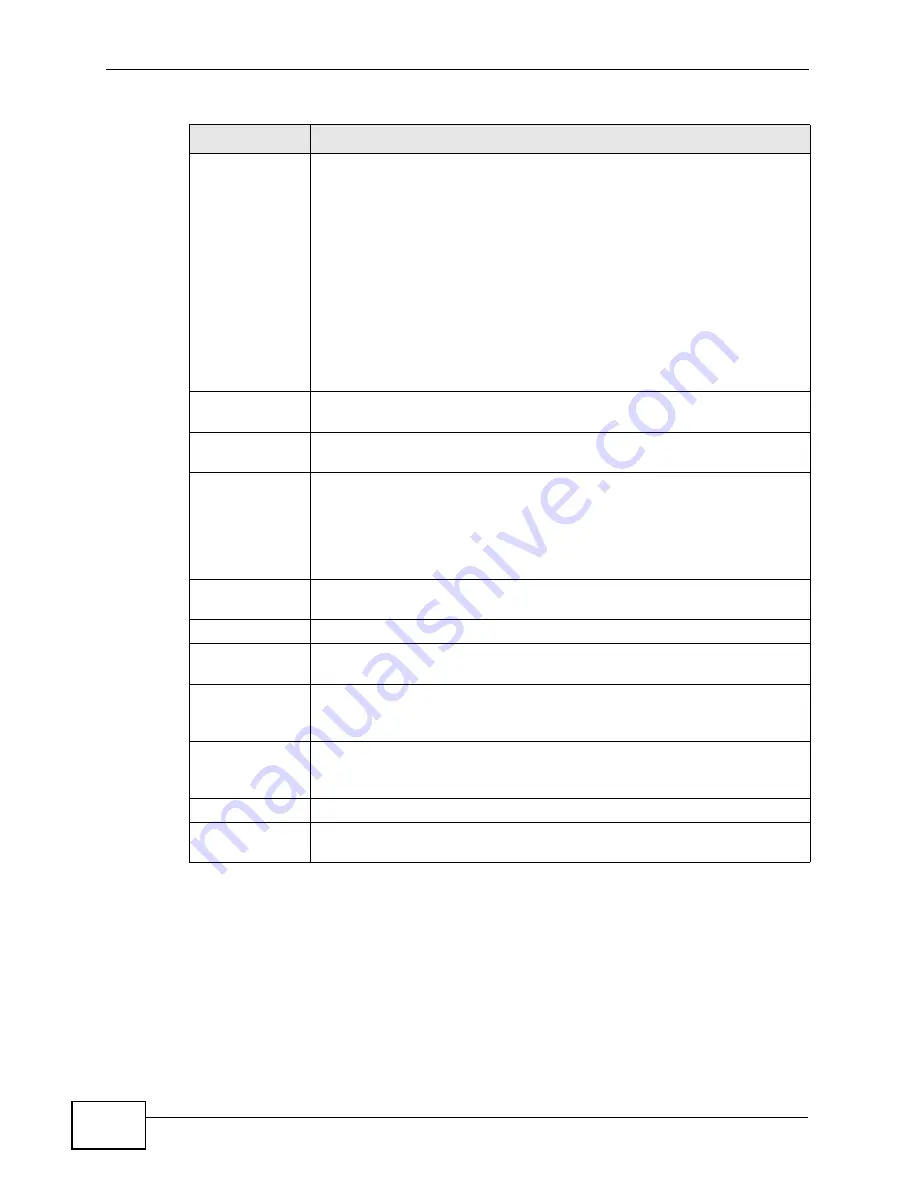
Chapter 26 System Log
X2002 User’s Guide
390
Log Schedule
This drop-down menu is used to configure the frequency of log
messages being sent as E-mail:
• Daily
• Weekly
• Hourly
• When Log is Full
•
None
.
If you select
Weekly
or
Daily
, specify a time of day when the E-mail
should be sent. If you select
Weekly
, then also specify which day of the
week the E-mail should be sent. If you select
When Log is Full
, an
alert is sent when the log fills up. If you select
None
, no log messages
are sent.
Day for Sending
Log
Use the drop down list box to select which day of the week to send the
logs.
Time for
Sending Log
Enter the time of the day in 24-hour format (for example 23:00 equals
11:00 pm) to send the logs.
SMTP
Authentication
SMTP (Simple Mail Transfer Protocol) is the message-exchange
standard for the Internet. SMTP enables you to move messages from
one e-mail server to another.
Select the check box to activate SMTP authentication. If mail server
authentication is needed but this feature is disabled, you will not
receive the e-mail logs.
User Name
Enter the user name (up to 31 characters) (usually the user name of a
mail account).
Password
Enter the password associated with the user name above.
Log
Consolidation
Active
Some logs may be so numerous that it becomes easy to ignore other
important log messages. Select this check box to merge logs with
identical messages into one log.
Log
Consolidation
Period
Specify the time interval during which the X2002 merges logs with
identical messages into one log.
Apply
Click this to save your changes and to apply them to the X2002.
Cancel
Click
Cancel
to go back to the Log Setting screen without saving your
changes.
Table 154
Log Setting > Internal Log (continued)
LABEL
DESCRIPTION
Summary of Contents for X2002
Page 2: ......
Page 24: ...Table of Contents X2002 User s Guide 24...
Page 25: ...25 PART I User s Guide...
Page 26: ...26...
Page 40: ...Chapter 2 How It Works X2002 User s Guide 40...
Page 99: ...99 PART II Technical Reference...
Page 100: ...100...
Page 124: ...Chapter 5 Network Deployment X2002 User s Guide 124...
Page 166: ...Chapter 7 Auto Provision X2002 User s Guide 166...
Page 170: ...Chapter 8 QoS X2002 User s Guide 170...
Page 248: ...Chapter 16 Click To Talk Group X2002 User s Guide 248...
Page 252: ...Chapter 17 Group Access Code X2002 User s Guide 252...
Page 304: ...Chapter 19 Auto Attendant X2002 User s Guide 304...
Page 312: ...Chapter 20 LCR X2002 User s Guide 312...
Page 346: ...Chapter 22 Call Services X2002 User s Guide 346...
Page 380: ...Chapter 25 Status Observation X2002 User s Guide 380...
Page 402: ...Chapter 27 Call Detail Record CDR X2002 User s Guide 402...
Page 410: ...Chapter 28 ACD Logs X2002 User s Guide 410...
Page 416: ...Chapter 29 Administrator Accounts X2002 User s Guide 416...
Page 424: ...Chapter 30 Diagnostics X2002 User s Guide 424...
Page 426: ...Chapter 31 X2002 User s Guide 426...
Page 446: ...Chapter 32 Remote Management X2002 User s Guide 446...
Page 448: ...Chapter 33 TFTP Management X2002 User s Guide 448...
Page 462: ...Chapter 35 License Control X2002 User s Guide 462...
Page 482: ...Chapter 36 Web Portal X2002 User s Guide 482...
Page 508: ...Chapter 39 Product Specifications X2002 User s Guide 508...
Page 548: ...Appendix C Legal Information X2002 User s Guide 548...
Page 562: ...Index X2002 User s Guide 562...


































